translation of idioms英语习语翻译21
Idioms 英语习语,谚语英汉解释
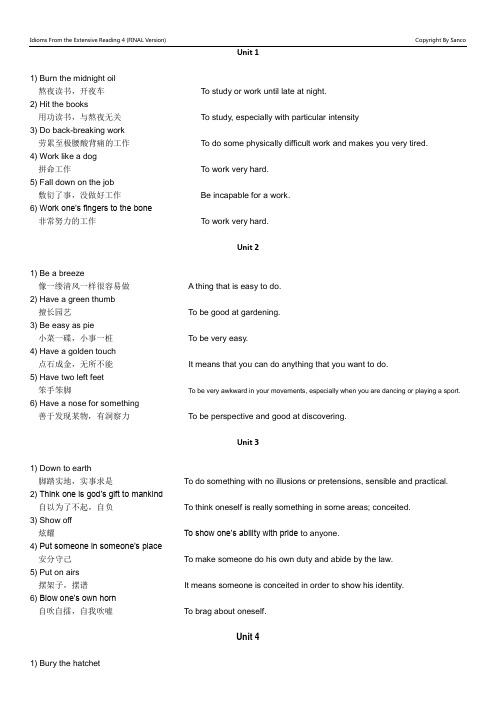
Unit 11) Burn the midnight oil熬夜读书,开夜车To study or work until late at night.2) Hit the books用功读书,与熬夜无关To study, especially with particular intensity3) Do back-breaking work劳累至极腰酸背痛的工作To do some physically difficult work and makes you very tired.4) Work like a dog拼命工作To work very hard.5) Fall down on the job敷衍了事,没做好工作Be incapable for a work.6) Work one’s fingers to the bone非常努力的工作To work very hard.Unit 21) Be a breeze像一缕清风一样很容易做 A thing that is easy to do.2) Have a green thumb擅长园艺To be good at gardening.3) Be easy as pie小菜一碟,小事一桩To be very easy.4) Have a golden touch点石成金,无所不能It means that you can do anything that you want to do.5) Have two left feet笨手笨脚To be very awkward in your movements, especially when you are dancing or playing a sport.6) Have a nose for something善于发现某物,有洞察力To be perspective and good at discovering.Unit 31) Down to earth脚踏实地,实事求是To do something with no illusions or pretensions, sensible and practical. 2) Think one is god’s gift to mankind自以为了不起,自负To think oneself is really something in some areas; conceited.3) Show off炫耀To show one’s ability with pride to anyone.4) Put someone in someone’s place安分守己To make someone do his own duty and abide by the law.5) Put on airs摆架子,摆谱It means someone is conceited in order to show his identity.6) Blow one’s own horn自吹自擂,自我吹嘘To brag about oneself.Unit 4言归于好,和解,摒弃前嫌To stop being unfriendly and become friends again.2) Button one’s lips一言不发,守口如瓶To refuse to talk and be silenced.3) Flow with the tide跟风,紧随潮流To keep following someone or the trend.4) Hold one’s tongue保持沉默,不开口To say nothing about something and stay silent.5) Let sleeping dogs lie别无事生非,招惹麻烦To avoid mentioning a subject or something that happened in the past, in order to avoid any problems or arguments.6) Mind one’s own business少管闲事,管好自己To concern oneself only with what is of interest to oneself and not interfere in the affairs of others.7) Rock the boat捣乱To do something that upsets a situation and causes problems.8) See eye to eye看法完全一致,完全同意To share the same views as somebody about something.Unit 51) Face up to something勇敢的面对To accept and deal with something that is difficult or unpleasant.2) Point one’s finger at someone指责某人To accuse somebody .3) Leave someone high and dry使某人很无助To leave someone unsupported and unable to maneuver; to leave someone helpless.4) Shoulder the responsibility能够承担责任To take responsibility.5) Pass the buck推卸责任To shirk the responsibility.6) Worm out of something推卸摆脱某事To get rid of somethingUnit 61) All or nothing孤注一掷的,没有商量余地 A situation which will end either in complete success or complete failureHaving no middle position or compromise available2) Meet someone halfway向某人妥协To compromise to somebody3) Give-and-take妥协,互让,互相迁就To have an exchange of views on some topic in order to make mutual concessions 4) Middle-of-the-road折中的办法,折中之计 A compromising solution that can be accepted by most people5) Stick to one’s guns固执己见To maintain one’s position or viewpoint when faced with opposition6) Find middle ground寻求找到一个中间立场 A set of opinions and decisions that two or more groups who oppose each other can agree on1) Go through with经历困难而完成,把事情坚持到底To do something even though it may be very unpleasant or difficult for you2) Hang in there坚持,不气馁,不畏困难To maintain a course of action despite negative outlook; to persist; to subsist while keeping high spirits 3) Give up放弃To stop trying to do something4) Stick with坚持做某事To continue or persist; to stick to5) Sweat out努力的忍耐以达到某个目的To work very hard to achieve somethingUnit 81) Be a copycat模仿别人To imitate or copy others2) Cut the apron strings摆脱依赖,独立生活To be or become impossible to manage or to control3) Be a yes-man唯唯诺诺的人To be a person who always agrees with people in authority in order to gain their approval.4) Have a mind of one’s own自有主见,能够独立思考To have one’s own idea and think independently5) Be on one’s own独立自主,不依靠他人To be independent6) Lead someone by the nose牵着别人的鼻子走,完全控制别人To have a full control of somebody7) Stand on one’s own two feet独立自主,自力更生To be independentUnit 91) Be as cool as a cucumber表示非常冷静,毫不紧张。
体育英语中常用习语的翻译

体育事业和文化的桥梁。然而,令广大中国观众和读者头
痛的是,英美国家的报刊杂志、广播等传媒的体育报道中 经常有大量的英语习语出现。只有弄懂这些习语的含义, 才能真正体会、理解报道的内容。为此,笔者探讨了习语 的定义、特点,并选取了体育英语中一些常用的习语,希 望通过对这些习语的历史渊源、涵义等方面的介绍可以对 读者在今后阅读体育报道时有所帮助。 1
中国西部科技
2007・09
体育黼常用习语的翻译
樊 云
(浙江师范大学外国语学院,浙江金华321 004) 摘要:习语是某一语言在使用过程中形成的独特的固定的表达方式,它存在于社会不同的专业和领域中,体育领域也不例外。本文 介绍了体育英语中常用的一些习语,并针对其翻译方法和途径提出了几点建议。 关键词:体育英语;习语;翻译 Translation of Idioms Frequently Used in Sports English
其含义、感情色彩以及形象都和我们汉语里的“事后诸葛
亮”相同。
4.3意译法
翻译过程中,若直译效果不好,套用又无合适的汉语 习语时,可采用意译法,把英语习语的含义表达出来。例 如“high five”,这是比赛场合经常见到的一个动作,是 两个人一起做的手势,各自把一个手伸得高高的,然后两 人把手掌相对用力拍一下。译成汉语时,我们可以采用意 译的方法,把它翻译成“举手击掌,通常用来表示胜利的 一种手势语”。 上面我们简略探讨了一下有关体育英语中的常用的一 些习语及其翻译方法,希望对广大的体育工作者和爱好者 在阅读有关体育的英语报道时有所帮助。近年来,我国体 育事业已开始转向市场化,国际体育交流日益频繁,而体 育翻译和研究工作却相对滞后。从某种意义上来说,体育 翻译工作的好坏,已经关系到我国体育事业的进一步腾飞 和对外开放的进一步扩大。因此,我们要大力加强体育翻 译的研究工作,为我国体育界做出自己应有的贡献。 参考文献:
Idioms英语习语,谚语英汉解释
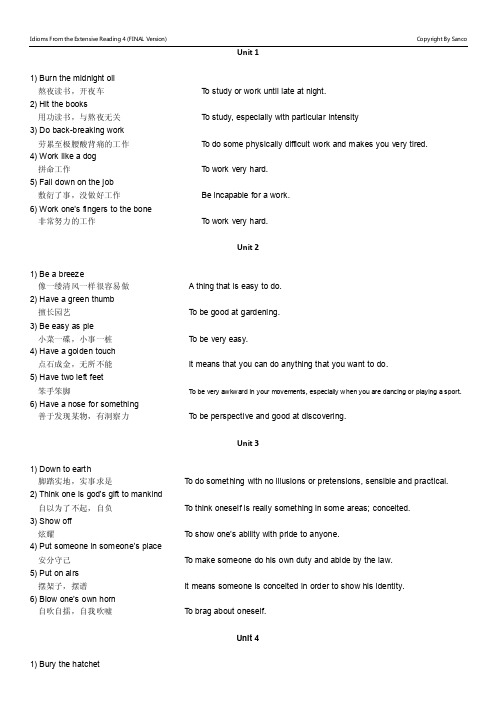
Unit 11) Burn the midnight oil熬夜读书,开夜车T o study or work until late at night.2) Hit the books用功读书,与熬夜无关T o study, especially with particular intensity3) Do back-breaking work劳累至极腰酸背痛的工作T o do some physically difficult work and makes you very tired.4) Work like a dog拼命工作T o work very hard.5) Fall down on the job敷衍了事,没做好工作Be incapable for a work.6) Work one’s fingers to the bone非常努力的工作T o work very hard.Unit 21) Be a breeze像一缕清风一样很容易做 A thing that is easy to do.2) Have a green thumb擅长园艺T o be good at gardening.3) Be easy as pie小菜一碟,小事一桩T o be very easy.4) Have a golden touch点石成金,无所不能It means that you can do anything that you want to do.5) Have two left feet笨手笨脚T o be very awk ward in your movements, especially when you are dancing or playing a sport.6) Have a nose for something善于发现某物,有洞察力T o be perspective and good at discovering.Unit 31) Down to earth脚踏实地,实事求是T o do something with no illusions or pretensions, sensible and practical. 2) Think one is god’s gift to mankind自以为了不起,自负T o think oneself is really something in some areas; conceited.3) Show off炫耀T o show one’s ability with pride to anyone.4) Put someone in someone’s place安分守己T o make someone do his own duty and abide by the law.5) Put on airs摆架子,摆谱It means someone is conceited in order to show his identity.6) Blow one’s own horn自吹自擂,自我吹嘘T o brag about oneself.Unit 4言归于好,和解,摒弃前嫌T o stop being unfriendly and become friends again.2) Button one’s lips一言不发,守口如瓶T o refuse to talk and be silenced.3) Flow with the tide跟风,紧随潮流T o keep following someone or the trend.4) Hold one’s tongue保持沉默,不开口T o say nothing about something and stay silent.5) Let sleeping dogs lie别无事生非,招惹麻烦To avoid mentioning a subject or something that happened in the past, in order to avoid any problems or arguments.6) Mind one’s own business少管闲事,管好自己To concern oneself only with what is of interest to oneself and not interfere in the affairs of others.7) Rock the boat捣乱T o do something that upsets a situation and causes problems.8) See eye to eye看法完全一致,完全同意T o share the same views as somebody about something.Unit 51) Face up to something勇敢的面对T o accept and deal with something that is difficult or unpleasant.2) Point one’s finger at someone指责某人T o accuse somebody .3) Leave someone high and dry使某人很无助To leave someone unsupported and unable to maneuver; to leave someone helpless.4) Shoulder the responsibility能够承担责任T o take responsibility.5) Pass the buck推卸责任T o shirk the responsibility.6) Worm out of something推卸摆脱某事T o get rid of somethingUnit 61) All or nothing孤注一掷的,没有商量余地 A situation which will end either in complete success or complete failureHaving no middle position or compromise available2) Meet someone halfway向某人妥协T o compromise to somebody3) Give-and-take妥协,互让,互相迁就T o have an exchange of views on some topic in order to make mutual concessions 4) Middle-of-the-road折中的办法,折中之计 A compromising solution that can be accepted by most people5) Stick to one’s guns固执己见T o maintain one’s position or viewpoint when faced with opposition6) Find middle ground寻求找到一个中间立场 A set of opinions and deci s ions that t w o or more groups w ho oppose each other can agree on1) Go through with经历困难而完成,把事情坚持到底To do something even though it may be very unpleasant or difficult for you2) Hang in there坚持,不气馁,不畏困难T o maintain a course of action despite negati v e outlook; to persist; to subsi s t while keeping high spirits 3) Give up放弃T o stop trying to do something4) Stick with坚持做某事T o continue or persist; to stick to5) Sweat out努力的忍耐以达到某个目的T o work very hard to achieve somethingUnit 81) Be a copycat模仿别人T o imitate or copy others2) Cut the apron strings摆脱依赖,独立生活T o be or become impossible to manage or to control3) Be a yes-man唯唯诺诺的人To be a person who always agrees with people in authority in order to gain their approval.4) Have a mind of one’s own自有主见,能够独立思考T o have one’s own idea and think independently5) Be on one’s own独立自主,不依靠他人T o be independent6) Lead someone by the nose牵着别人的鼻子走,完全控制别人To have a full control of somebody7) Stand on one’s own two feet独立自主,自力更生T o be independentUnit 91) Be as cool as a cucumber表示非常冷静,毫不紧张。
英语专业英译汉 第十章.习语的翻译

At breakfast, eat like a king. 早饭吃饱。 At lunch, eat like a prince. 中饭吃好。 At supper, eat like a pauper. 晚饭吃少。 Rolling stone gathers no moss. 滚石不生苔(搬家不聚财)。 under the counter (table) 鬼鬼祟祟
1 21 返回章重点退出 返回章重点退出
习语翻译
补充练习
14.I heard my master mounting the stairs —— the cold sweat ran from my forehead: I was horrified.
(Emily Brontë Wuthering Heights) :
1 11 返回章重点退出 返回章重点退出
1. 3 释义法 (Explanation Translation) 释义法是以忠实通顺地表达原习语的思想、内容、 意义为目的,采用解释说明手法,表达原习语在上下 文中的涵义。一般对原文中的习语,不逐字逐句地去 翻译,而是按语义、修辞或句法的需要,增加一些解 释说明的词,补充完善原习语的意思。释义法翻译一 般用在双语文化或语言的差异很大,译入语难以直接 表达的场合。
1 19 返回章重点退出 返回章重点退出
习语翻译
补充练习
6) wash one’s hands of a thing 【译】洗手不干……;与……断绝关系 7) have a ball at one’s foot 【译】有成功的机会 8)to live a cat-and-dog life 【译】过着不和谐的生活(过着猫狗般的生活) 9)to keep one’s head above water 【译】奋力图存;勉强凑合过日 10)When in Rome, do as the Romans do. 【译】到什么山,唱什么歌。(入乡随俗)
习语、外来语的翻译
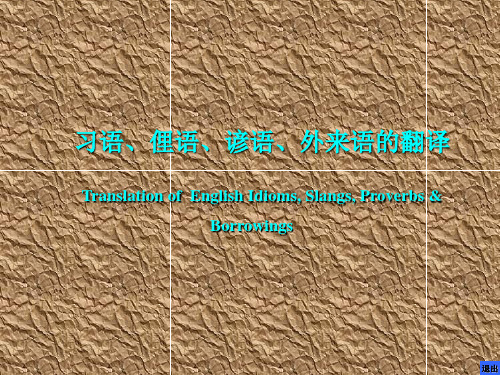
Translation of English Idioms, Slangs, Proverbs & Borrowings
退出
习语的翻译
(Translation of English Idioms)
英语习语是一个比较宽广的范畴,是经过长
时间的使用而提炼出来的固定短语或短句,是人 类从劳动中创造出来,和民族的历史背景、经济 生活、地理环境、风俗习惯、心理状态紧密相关, 把丰富的思想内涵精辟地表达出来,言简意赅、
风格和异域文化特色、文化意象,对原习语的表现 形式和意义原则上不做任何调整。鲁迅先生说过: “竭力想保存原书的口吻,大底连语句的词语也不 甚颠倒”。这也许就是直译的意思。
7 返回章重点退出
a die-hard think tank time frame the hot line paper tiger armed to the teeth comfort woman to burn one’s boats to fan the flame(s) to turn a deaf ear to to have a well-oiled tongue a gentleman’s agreement
人生如梦。
返回章重点退出
12
Give him an inch and he’ll take an ell. 得寸进尺。 Beauty is in the eye of the beholder. 情人眼里出西施。 He spent money like water. 他花钱跟流水似地。 An idle youth,a needy age. 少壮不努力,老大徒伤悲。 While there is life, there is hope. 留得青山在,不怕没柴烧。
10.习语、俚语、谚语、外来语的翻译
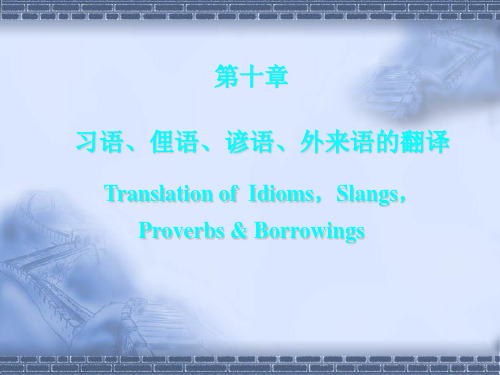
4.Bell is known by the sound.
【译】听音便知钟好坏。
5.Great honours are great burdens.
【译】誉高任重。
10 返回章重点退出
课堂互动3:翻译下列谚语(参考译文)
6.All men of action are dreamers.
A. 街上的妇女 B. 妓女 B. 温柔的妈妈 B. 男(性)情人
22. sweet mama
A. 女(性)情人 A. 好爸爸
23. sweet papa/ sweet man
24. upstairs /upper story
A. 脑子 B. 楼上的故事
B. 女电话员
9 返回章重点退出
25. call girl
【译文】我们常吵闹,但仍很相爱。
4 返回章重点退出
课堂互动2:正误判断(参考译文)
1.bull’s eye A. 靶心,十环 B. 牛眼睛 2.busboy A. 餐馆勤杂工 B. 公共汽车售票员 3.cold fish A. 冻鱼 B. 死气沉沉的人 4.criminal lawyer A. 刑事律师 B. 犯罪律师 5.dead horse A. 死马 B. 预付的工资,旧债
【译】诚意最少话最多。
10.Blessed are the pure in heart.
【译】清心者有福。
11 返回章重点退出
课堂互动3:翻译下列谚语(参考译文)
11.First class men are hard to come at.
【译】人才难得。
12.Enough is as good as a feast.
【译】深水有好鱼。
汉语成语翻译

(7).谚语俗语 谚语俗语 有些成语是群众口头中使用的谚语或俗语。 A. 亡羊补牢 Mend the fold after the sheep is stolen. B. 敝帚千金 cherish an old broom as if it were a thousand pieces of gold—cherish a possession of little value.
2) Literal translation with annotations直译加注有些习 直译加注
语含有比喻意义、象征意义或是历史典故等) 语含有比喻意义、象征意义或是历史典故等
a.木已成舟:The wood is already made into a boat—what’s done is done. b. 杞人忧天: Like the man of Chi who was haunted by the fear that the sky might fall—unnecessary anxiety. c . 朝秦暮楚: Serve the State of Qin in the morning and the State of Chu in the evening—playing fast and loose (quick to switch sides)
(6)人民群众用过的精炼词组 人民群众用过的精炼词组
成语中绝大部分是人民群众创造的,其中有一些 具有浓厚的口语色彩和生活气息。
A. 大海捞针 look for a needle in a bunch of haystack B. 指桑骂槐 point at the mulberry and abuse the locust—point at one but abuse another (literal +annotation) make oblique accusations (free)
汉译英 习语翻译
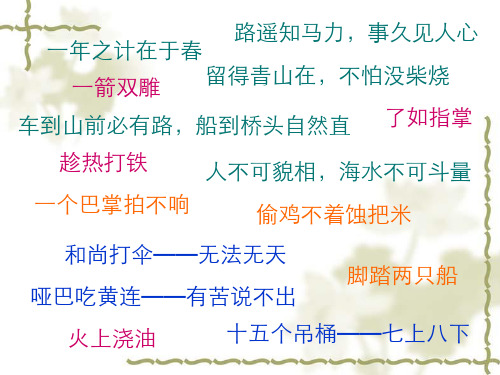
Features of Idioms
5、习语常利用声音的和谐来达到易懂易记、顺口入耳、生动有力的目的。 习语常利用声音的和谐来达到易懂易记、顺口入耳、生动有力的目的。 利用韵脚:狗咬吕洞宾,不识好人心;一招鲜,吃遍天;良药苦口利于病,忠言逆 利用韵脚 耳利于行; A friend in need is a friend indeed. East or west, home is best. Man proposes, God disposes. Health is better than wealth. Beggars should not be choosers. fair and square; high and dry; wear and tear. 利用双声: 利用双声:八面玲珑,聪明伶俐,慷慨激昂,明媚灿烂 Alliteration: as blind as a bat, as busy as a bee, as clear as crystal, as dead as a doornail, as cool as a cucumber, as red as a rose, as proud as a peacock, at sixes and sevens, spick and span, then and there through thick and thin tit for tat neither fish, flesh or fowl Care killed the cat. Money makes the mare to go. Many men, many minds. Speech is silver (silvern), silence is golden.
一年之计在于春 一箭双雕 趁热打铁 一个巴掌拍不响
英语idiom例子

英语习语(idioms)是英语语言中的一种特殊表达方式,通常由固定的短语或表达组成,具有特定的含义,不能仅仅通过其组成部分的字面意义来理解。
以下是一些英语习语的例子:1. "It's raining cats and dogs." - 意思是“下着倾盆大雨”,而不是字面意义上的“下着猫和狗”。
2. "Bringing coals to Newcastle" - 意思是“做多余的事情”,因为纽卡斯尔(Newcastle)是英国的一个煤炭重镇。
3. "The early bird catches the worm." - 意思是“早起的鸟儿有虫吃”,即提早行动的人能够得到更好的机会或好处。
4. "That's a long shot." - 意思是“那是一个不太可能的事情”,而不是字面意义上的“那是一次长射”。
5. "You're a big help." - 意思是“你很有帮助”,而不是字面意义上的“你是一个大帮助”。
6. "It's a piece of cake." - 意思是“那很容易”,而不是字面意义上的“那是一块蛋糕”。
7. "He's a dead ringer for his brother." - 意思是“他和他兄弟长得一模一样”,而不是字面意义上的“他已经死了,还像个钟摆一样摆动”。
8. "She's always the first to arrive and the last to leave." - 意思是“她总是第一个到达,最后一个离开”,而不是字面意义上的“她总是第一个到达和最后一个离开”。
9. "He's a fast talker." - 意思是“他说话很快”,而不是字面意义上的“他说话很流利”。
英语习语的翻译
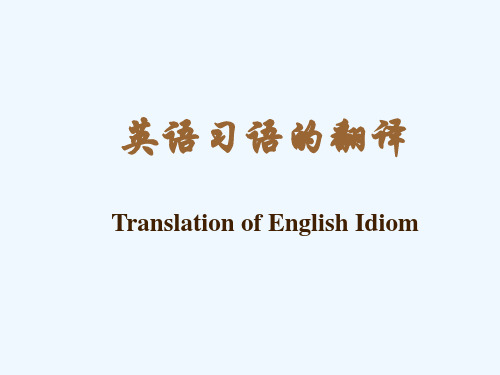
The Definition of Idioms
习语是某一语言在使用过程中形成的独特的固 定的表达方式。广义的习语(idioms)包括俗 语(colloquialisms)、 谚语(proverbs)和俚 语(slang expressions)等。
英汉两种语言历史悠久,包含着大量的习语, 它们或含蓄、幽默、或严肃、典雅,不仅言简 意赅,而且形象生动,妙趣横生,给人一种美 的享受。由于地理、历史、宗教信仰、生活习 俗等方面的差异,英汉习语承载着不同民族的 文化特色和文化信息,它们与文化传统紧密相 连,不可分割。习语中的文化因素往往是翻译 中的难点。
有其父必有其子
a lion at home, a mouse abroad
在家如狮,在外如鼠
Life is short and time is swift 人生苦短,岁月如逝
2.英语习语和汉语习语形义部分相同
as strong as a horse
力大如牛
a lion in the way
拦路虎
习语不仅大量地出现在文艺作品中和政治、 科学论文中,在口语中也会使用一些习语, 因此,习语的翻译是一个非常重要的问题, 习语翻译的好坏对整个译文的质量及听懂英 语口语都有直接的影响。
英语习语汉译主要有以下四种方法: 直译法 直译加注法 释义 归化
1.直译 (对等翻译法)
如果英语习语和汉语习语在形义方面完全相同,或
鉴于公司间的恶意接收出价最近猛增,这个国家里的那些最大的 公司有15%已为高级管理人员配备了“黄金降落伞”(*黄金降落 伞:一种工作合同,规定所在公司如被收购,雇员[常为高级行政 管理人员]可以辞职,而其薪水和各种福利照旧,直至合同期满。)
Pampering is building into what is called the "four-two-one syndrome"*-four grandparents and two parents, all doting on an only child.
英译汉看这个就够了Translation of English idioms
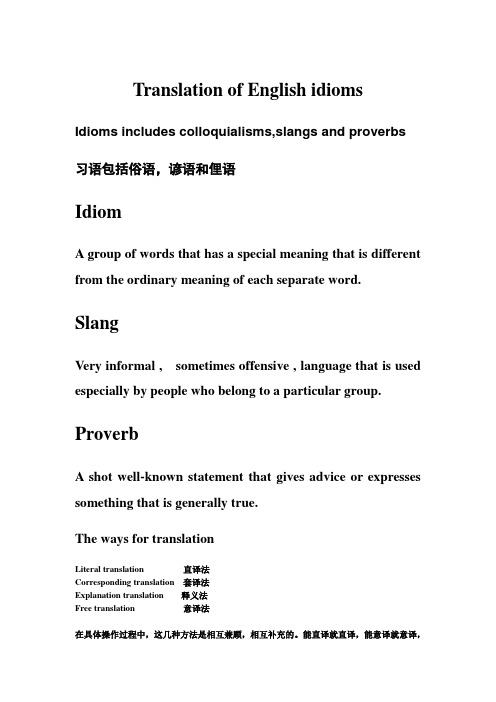
Translation of English idiomsIdioms includes colloquialisms,slangs and proverbs习语包括俗语,谚语和俚语IdiomA group of words that has a special meaning that is different from the ordinary meaning of each separate word.SlangVery informal , sometimes offensive , language that is used especially by people who belong to a particular group.ProverbA shot well-known statement that gives advice or expresses something that is generally true.The ways for translationLiteral translation 直译法Corresponding translation 套译法Explanation translation 释义法Free translation 意译法在具体操作过程中,这几种方法是相互兼顾,相互补充的。
能直译就直译,能意译就意译,能套译就套译。
以不损害原作的“异国情调”为前提,以保持“原汁原味”为特色,便是译者应遵循的翻译原则。
1. Translation of English Idioms习语的翻译1.1直译法不违背译文语言规范,不引起错误联想,能保持英语习语的比喻、形象、民族特色、地方习惯的译法。
a die-hard死硬派think tank思想库time frame时间框架the hot line热线paper tiger纸老虎armed to the teeth武装到牙齿comfort woman慰安妇to burn one’s boats破釜沉舟to fan the flame(s)煽风点火to turn a deaf ear to充耳不闻to have a well-oiled tongue油腔滑调a gentleman’s agreement君子协定an eye for an eye, a tooth for a tooth以眼还眼,以牙还牙Practice makes perfect.熟能生巧Long absent, soon forgotten. 久别情疏Add fuel to the fire. 火上加油Run with the tail between the legs.夹着尾巴逃跑walls have ears 隔墙有耳Under one’s nose 在某人鼻子底下Packed like sardines 挤得像沙丁鱼罐头Sour grapes 酸葡萄The Trojan horse 特洛伊木马The heel of Achilles 阿基里斯的脚跟The sword of Damocles 悬在达摩克利斯头顶上的剑The cold / hot war 冷战/ 热战An olive branch 橄榄树枝The open-door policy 门户开放政策The most-favored-nation policy 最惠国条款Shuttle diplomacy 穿梭外交A cat has nine lives 猫有九命Blood is thicker that water 血浓于水Barking dogs do not bite 吠狗不咬人A rolling stone gathers no moss 滚石不生苔1.2. Corresponding Translation 套译法用译文语言里的同义习语去套译原文中的习语的一种翻译方法套译法实际上也属于归化译法(domestication),但这种套译的机会不是很多。
广东外语外贸大学高等教育自学考试商务英语专业论文参考选题

广东外语外贸大学高等教育自学考试商务英语专业论文参考选题一、专业介绍本专业培养具有良好职业道德,掌握一定经贸理论知识、熟悉国际商务操作规程,具备扎实的国际经济和国际贸易理论基础,掌握国际经济与国际贸易的基本知识与基本技能,具有较扎实的英语听、说、读、写、译能力,较好的英语沟通能力的应用型英语人才。
毕业后能在外贸、文化教育、旅游(酒店)等行业从事翻译、外贸实务、教学和涉外文秘等工作。
主要课程:高级英语,综合英语,商务英语听说,商务英语翻译,国际贸易实务,外刊经贸知识选读。
二、选题要求1、论文选题必须是属于本专业方向范畴以内的,可参考本文所列的论文选题,但不仅限于本文所列的论文选题。
2、本文所列论文选题主要用于指引论文写作可选择的研究方向,不可照抄本文论文选题作为题目。
3、考生可选用本文论文选题中的关键词(红色字体),结合自己的写作思路或研究方向确定论文写作题目。
三、论文选题:Translation related topics:1.The Influence of Cultural Factors on Translation of idioms in Business English试论文化因素对经贸领域中习语翻译的影响2.Lexical Features of Business Contract English and Its Translation经贸合同英语的词法特征及其翻译3.The Characteristics of Foreign Trade English Translation经贸英语的翻译特点4.Influence of Contextual factors on Business English Translation经贸英语翻译中语境因素的作用5.On the Translation Criteria of Business English 试论经贸英语翻译的标准6.Understanding and Translation of the Divisional Phenomena in BusinessEnglish Contracts英语经贸契约分隔现象的理解与翻译7.On Abbreviations in Business English谈经贸英语中的缩略语现象8.On the Characteristics of Business English Vocabulary经贸英语的词汇特点9.Diction in Economy and Trade Translation经贸翻译的词义选择10.Multi-discipline motivations of the Business English Vocabulary论商务英语词汇的多学科性11.On the linguistic/ cultural Features of Business English E-mails浅谈商务英语电子邮件的写作特点12.Analysis of the Stylistic Features of the Contract English浅析合同英语的文体特点13.Translation of English Advertisement in Cross-cultural communication跨文化背景中的广告英语翻译14.Translation of Dates, Amount and Numbers in the Business English Contracts浅析商务合同中日期、金额和数字的翻译15.On Translating Strategies of Modern Business English现代商务英语的翻译策略16.On the Principle of Faithfulness in C-E Business Translation浅谈商务英语英汉翻译的"信"原则17.Methods and Principles of Trade Mark Translation商标翻译的方法及应遵循的基本原则18.The Linguistic Characteristics and Translation Strategies of EnglishAdvertisement广告英语的语言特点及翻译策略Linguistic aspects:19.A Study of the syntactic features in English Business Contracts 试谈英语经贸合同的句法特点20.On the Accuracy of Business English Translation浅析商务英语翻译的准确性21.On the Rhetorical Features and Translation strategies of Advertising English浅析广告英语的修辞特点及翻译方法22.Translation of Metaphor in Business English 浅谈商务英语中的隐喻翻译23.On "Faithfulness" and "Innovation" in Business English Translation外贸英语翻译的"忠实"与"变通"24.The Strategies of Domestication and Dissimulation on Advertising EnglishTranslation广告英语翻译的"归化"和""异化"策略25.Cross-cultural Factors i n Advertising English Translation广告英语翻译中的跨文化因素26.On the Rhetoric and Translation Approaches in Advertising English论广告英语的修辞艺术和翻译方法27.The Function of Fuzzy Language in Business English Writing论模糊语言在商务英语写作中的作用28.The Application of Polite Principles in Business English Writing 礼貌原则在商务英语写作中的应用29.On the Preciseness of Business English Contracts论商务英语合同语言的严谨性30.How to Achieve Consideration in Business E-mails如何实现商务电子邮件中的“consideration”31.An Analysis of the Rhetorical Devices in Advertising English广告英语的修辞方法探析32.On the Translation Principles of Trademarks in Business English浅析商务英语中的商标翻译33.On Functions of Business English Abbreviations 浅析商务英语中缩略语的功能34.Influence of Cultural differences on the Translation of Business English文化差异对商务英语翻译的影响35.On the Writing Features of Business English Letters 浅析商务英语信函的写作特点36.On Linguistic features of Business English Correspondence 商务英语信函的语言特征Culture related topics:37.The Influence of Cultural Elements on the Translation of idioms in BusinessEnglish 浅析文化因素对商务英语习语翻译的影响38.A Pragmatic Analysis of Long Sentences in Business English Contracts商务英语合同中的长句语用分析39.The Lexical Features of E-commerce English 电子商务英语的词汇特征分析40.A Study of the Cross-cultural Factors in Business Negotiation 商务谈判中的跨文化因素研究41.Functions of Non-verbal Communication in Business Negotiation 非语言交际在商务谈判中的功能研究42.A Study of Cultural Factors in Sino-American Business Negotiation中美商务谈判中的文化因素研究Business English teaching related topics:43.The Application of Case Study in Business English Teaching案例教学法在商务英语教学中的应用44.The Application of Situated Teaching Theory in Business English Teaching 情境教学理论在商务英语教学中的运用45.On Fostering Communicative Competence in Business English Teaching 试论商务英语教学中语言交际能力的培养46.The Application of Task-based Teaching in Business English Teaching 任务教学法在商务英语教学中的应用47.Cultivation of Cross-cultural Communication competence in BusinessEnglish Teaching 商务英语教学中跨文化交际能力的培养温馨提示:如《英语教育》专业本次以新专业《英语》申请学位,请参考旧专业《英语教育》论文选题。
习语翻译(学生)
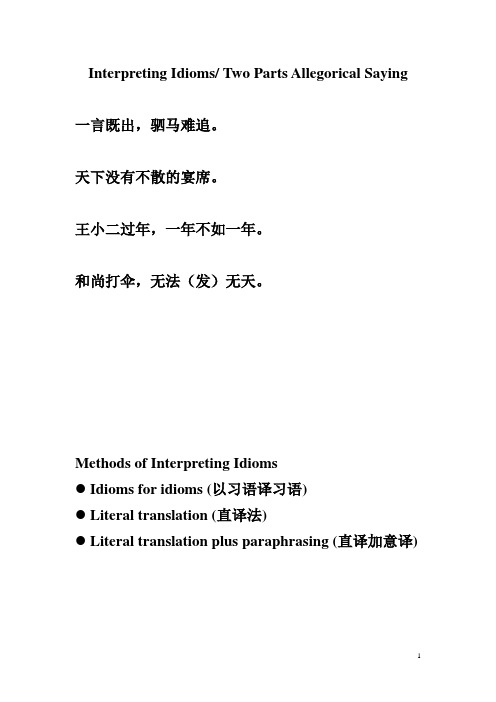
Interpreting Idioms/ Two Parts Allegorical Saying 一言既出,驷马难追。
天下没有不散的宴席。
王小二过年,一年不如一年。
和尚打伞,无法(发)无天。
Methods of Interpreting Idioms●Idioms for idioms (以习语译习语)●Literal translation (直译法)●Literal translation plus paraphrasing (直译加意译)1. Idiom for idioms (以习语译习语)To fish in the air.缘木求鱼A fall into fit, a gain in your wit.吃一堑,长一智。
Look before you leap. / Think twice before you leap.三思而后行。
There is no smoke without fire.无风不起浪。
As you sow, so will you reap.种瓜得瓜,种豆得豆。
Better be the head of a dog than the tail of a lion.宁做鸡头,不做凤尾。
To kill the goose that lays golden eggs.杀鸡取卵。
Strike while the iron is hot.趁热打铁。
Don’t wash your dirty linen in publish.家丑不可外扬。
Hungry dogs will eat dirty puddings.饥不择食。
2. Literal translation (直译法)易如反掌鼠目寸光Short-sighted君子动口不动手留得青山在,不怕没柴烧。
海内存知己,天涯若比邻。
坦白从宽,抗拒从严。
Leniency confess, punishiment, resist 削足适履远水解不了近渴。
英语成语翻译

The Translation of Idioms--by Wu Xiaofei, Hu Ping, Fu Mei Thank you very much. Honorable Mr. Zhang, Ladies and gentleman, Good morning!I am very happy to have this chance to give my presentation.As you see, our theme is the translation of idioms.Firstly, I would like to talk about the definition of the terms I shall use in my presentation.DefinitionIdioms are words, phrases, or expressions that cannot be taken literally.In other words, when used in everyday language, they have a meaning other than the basic one you would find in the dictionary. Every language has its own idioms. Idioms are set phrases or short sentences that are unusual either grammatically or semantically for their meanings cannot be derived from the conjoined meaning of its elements, as in “It’s raining cats and dogs!”Background informationAs we all know, idioms can somehow reflect characteristics of culture. The Chinese and English idioms are actually the typical examples. I’d like to show the differences as follows.1.Differences of comparison (比喻)中国人常常用成语“雨后春笋”来形容一般事物的迅速发展和大量涌现。
Translation of idioms英语习语翻译

• 初生牛犊不怕虎 译文:New-born calves make little of tigers. • 口蜜腹剑 译文:to be honey-mouthed and dagger-hearted • 声东击西 译文:to shout in the east and strike in the west • 望梅止渴 译文:quench one’s thirsty by thinking of plums • 画饼充饥 译文:to draw cakes to allay hunger
• Domesticating translation:
– minimizes the foreignness of the SL text by changing the heterogeneous elements into what is familiar to the TL text
• 异化:主张直译原文的语言形式(即便 这种语言形式不完全切合译语习惯), 保留构成原语言的文化因子(主要是形 象)。
• 归化:主张以纯熟地道的译语和相关联 的文化因子进行翻译。
Translation of idiom (C-E)
• Foreignizing translation • 剖腹藏珠 出自《资治通鉴· 唐纪· 太宗贞观元年》: “吾闻西域贾胡得美珠,剖身以藏之,有诸?” • rip open the stomach and hide a pearl—sacrifice life for money • 你自己手里拿着这个,岂不好?明儿再送来。——就 失了手也有限的,怎么忽然又变出这“剖腹藏珠”的 脾气来!(《红楼梦》) • 译文:Wouldn’t that be better? You can send it back later. And even if want to “cut open your stomach to hide a pearl”?
Lesson 8 习语的翻译
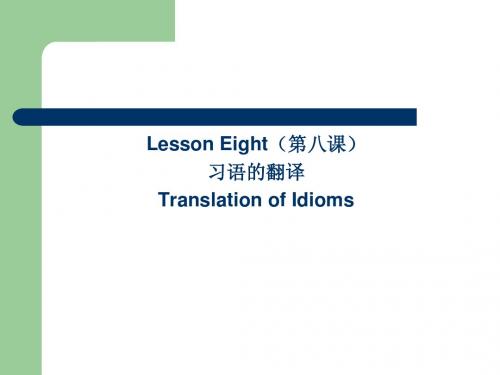
III. Translation of idioms
1. Corresponding idioms There are some English idioms corresponding to ready-made idioms both in meaning and in structure. Such idioms can be turned into corresponding Chinese ones and vice versa. 1) In ancient times if a man’s eye was put out by his enemy, he might get revenge by putting his enemy’s eye out. This was the rule of an eye for an eye and a tooth for a tooth.. 2) You pretended that you were helping them out of their difficulty, but actually you are pouring oil on the fire and making matters worse. 3) If it is a wet summer the firm making mackintoshes will find good markets, if there is a heat wave there will be a special big demand for bathing suits, if we have shares in both we need not feel unduly anxious about the weather, for what we lose on the swings we shall gain on the roundabouts. 4) Wall has ears. 5) a bolt from the blue
Group 7

Corresponding translation/ Borrowing 套译法 He spent money like water. 他花钱跟流水似地。 他花钱跟流水似地。 An idle youth,a needy age. , 少壮不努力,老大徒伤悲。 少壮不努力,老大徒伤悲。 While there is life, there is hope. 留得青山在,不怕没柴烧。 留得青山在,不怕没柴烧。 Yang Yuhuan——Helen of Troy in China.
Free translation 意译法
Examples: At breakfast, eat like a king. to break the ice 打破沉默 早饭吃饱。 早饭吃饱。 to dog-ear a book At lunch, eat like a prince. 折书角 中饭吃好。 中饭吃好。 At supper, eat like a pauper. to hold one’s horse 忍耐 晚饭吃少。 晚饭吃少。 Rolling stone gathers no moss. 滚石不生苔(搬家不聚财)。 滚石不生苔(搬家不聚财)。 under the counter (table) 鬼鬼祟祟
Translation of English Idioms, Slangs, Proverbs & Loanwords
习语、俚语、谚语、 习语、俚语、谚语、外来语的翻译
Translation of English Idioms, Slangs, Proverbs & Loanwords
1 Translation of English Idioms 2 3 4 Translation of Slangs Translation of Proverbs Translation of Loanwords
英语习语的理解与翻译
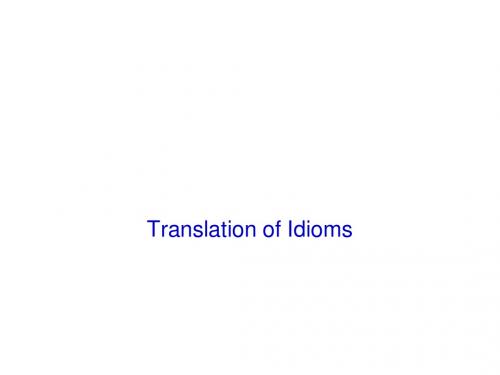
Translation of Idioms
• 在语言的发展过程中,人们经过长期的社会实践 提炼出一些固定的短语或短句,这就是习语,也 是语言的精华,是人们智慧的结晶。 • 英语习语从广义上讲,包括俗语 (colloquialism)、谚语(proverb)、俚语 (slang expression)等。
• 习语大多短小精悍、言简意赅、生动形象、通俗 意懂,是广大人民所喜闻乐见的一种形象化的语 言,不仅具有浓郁的民族和地方色彩,还集中体 现了语言中的各种修辞手法。因此在翻译习语时, 除了要忠实地表达出原文的含义外,还应该尽可 能地保留原文的丰富联想、形象比喻以及地方色 彩等。 • 英语的习语翻译通常采用四种方法:直译法、直 译加注法、套译法和意译法。
• 五、英语习语翻译中值得注意的问题
• 英语习语的译文并不是唯一的。 英语习语的译文并不是唯一的。 • 英汉两种语言的习语中有许多带有浓厚的民族色 或者包含某些人名和地名, 彩,或者包含某些人名和地名,这些习语在英汉 两种语言中通常是不能互相替换的。 两种语言中通常是不能互相替换的。 • 英语习语的翻译不可望文生义。 英语习语的翻译不可望文生义。 • 准确理解英语习语,弄清褒贬之分。 准确理解英语习语,弄清褒贬之分。
• 一、直译法
• • • • • 采用直译的习语多半是英语和汉语在比喻和形 象方面基本相同的 to add fuel to the flames 火上加油 to be on thin ice 如履薄冰 walls have ears 隔墙有耳 a stony heart 铁石心肠
• 二、直译加注法 • 有些习语还含有比喻意义、象征意义或历史典故 等,在翻译的时候一般要在其后加注进行解释。 • Crocodile tears 鳄鱼的眼泪(假慈 悲) • The tower of ivory 象牙塔(脱离现实 的小天地) • Waterloo 滑铁卢(惨败的事件) • Wolf in sheep’s clothing 披着羊皮的狼 (伪善的敌人)
第七讲 习语的翻译1

• •
• • •
• • • • •
•
英汉习语中所反映的文化差异表现(习语的来源) : 包括四个方面:地理环境;传统习俗;宗教信仰;历史典故 1.地理环境对习语文化的影响。 习语的形成与人们的劳动生活密切相关。 英国是一个岛国,人们的生活以航海打渔为主;而汉民族生活在亚洲大陆东部, 地处北温带,气候比较温和,人们的生活与土地有着不可分割的关系。由于自然 环境和地理上的差异,中国人和西方人对同一词汇的理解、联想也有所不同。 例如,在形容一个人非常奢侈浪费时,英语是“spend money like water”,而汉 语是“挥金如土”。 中国是一个内陆国家,幅员辽阔,有许多名山大川,因此有许多与山有关的成语, 如“安如泰山”,“开门见山”,“江山易改,禀性难移”及“留得青山在,不愁 没柴烧”等。而在英语中则有许多有关于船和海的习语,在汉语中找不到与之 完全对应的习语。如“all at sea(不知所措)”,“in deep water(陷入严重困 境)”,“when one‘s ship comes home(当某人发财时)”,“water under the bridge(无法挽回的过去)”,“be of the first water(第一流的)”等。 而且,地域不同,各地自然景观亦各有特点,具体反映在语言上也有所不同。 在用自然景观或物体来作比喻时,语言间就存在着明显的差异。如在汉语中有 “有眼不识泰山”、“不到黄河心不死”、“不到长城非好汉”等。而在英 语中则有“All roads lead to Rome”,“Take a French leave”,“Carry Coals to Newcastle(把煤送到纽卡斯尔,此地盛产煤,意为多此一举)”,“go Dutch”等。
•
相关理论与概念:
